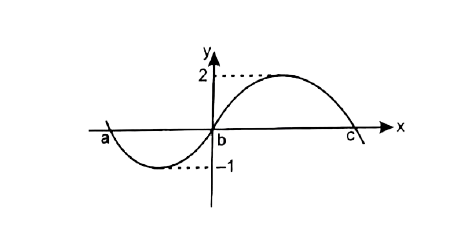Let f(x)=(x−a)(x−b)(x−c) be a ral vlued function where a<bc(a,b,c∈R) such that f''(α)=0. Then if α∈(c1,c2), which one of the following is correct ?
α<c1<bandb<c2<c
α<c1,c2<b
b<c1,c2<c
None of these
The correct Answer is:A
Step by step video, text & image solution for Let f (x)= (x-a) (x-b)(x-c) be a ral vlued function where a lt b c (a,b,c in R) such that f ''(alpha ) =0. Then if alpha in ( c _(1), c _(2)), which one of the following is correct ? by Maths experts to help you in doubts & scoring excellent marks in Class 12 exams.
Updated on:21/07/2023Topper's Solved these Questions
- APPLICATION OF DERIVATIVES Book:VK JAISWALChapter:APPLICATION OF DERIVATIVES Exercise:EXERCISE (ONE OR MORE THAN ANSWER IS/ARE CORRECT )
Explore 29 Videos
- APPLICATION OF DERIVATIVES Book:VK JAISWALChapter:APPLICATION OF DERIVATIVES Exercise:EXERCISE (COMPREHENSION TYPE PROBLEMS)
Explore 16 Videos
- AREA UNDER CURVESBook:VK JAISWALChapter:AREA UNDER CURVESExercise:EXERCISE (SUBJECTIVE TYPE PROBLEMS)
Explore 8 Videos
Similar Questions
Knowledge Check
Let f (x) be a polynomial function of degree 3 where a<b<candf(a)=f(b)=f(c). If the graph of f (x) is as shown, which of the following statements are INCORRECT ? (Where c>|a|)
 A∫caf(x)dx=∫cbf(x)dx+∫bcf(x)dxB∫caf(x)dx<aC∫baf(x)dx<∫bcf(x)dxD1b−a∫baf(x)dx>1c−b∫cbf(x)dx
A∫caf(x)dx=∫cbf(x)dx+∫bcf(x)dxB∫caf(x)dx<aC∫baf(x)dx<∫bcf(x)dxD1b−a∫baf(x)dx>1c−b∫cbf(x)dxLet f(x)=ax2+bx+c,a≠0, such the f(−1−x)=f(−1+x)∀x∈R. Also given that f(x)=0 has no real roots and 4a+b>0.
Let α=4a−2b+c,β=9a+3b+c,γ=9a−3b+c, then which of the following is correct ?Aβ<α<γBγ<α<βCα<γ<βDα<β<γA function f(x) is differentiable at x=c(c∈R). Let g(x)=|f(x)|,f(c)=0 then
Ag(x) is not differentiable at x=cBfor g(x) to be differentiable at c, f'(c)=0Cfor g(x) to be non-differentiable at c,f'(c)=0Dnone of these
Consider the quadratic function f(x)=ax2+bx+c where a,b,c∈R and a≠0, such that f(x)=f(2−x) for all real number x. The sum of the roots of f(x) is
View SolutionLet g(x) be the inverse of the function f(x)=lnx2,x>0. If a,b,c∈R ,then g(a+b+c) is equal to
View SolutionLet g(x) be the inverse of an invertible function f(x) which is differentiable at x=c . Then g′(f(x)) equal. (a)f′(c) (b) 1f′(c) (c) f(c) (d) none of these
View SolutionIf α and β are roots of ax2+bx+c=0 and a+c=b then the roots are
View SolutionIf f''(x)<0,x∈(a,b),f(c) attains maximum value at (c,f(c)), where a < c < b, then f'(c ) is equal to :
View Solution